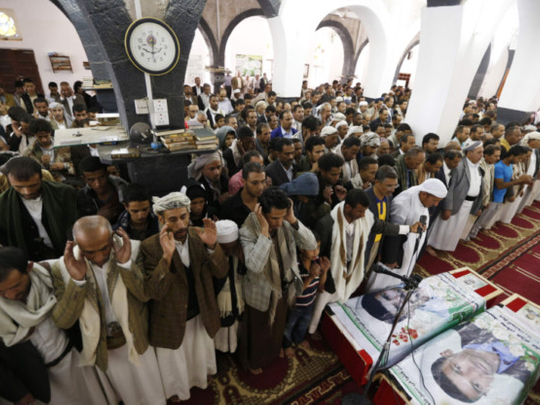
Sana’a: Al Qaida militants have killed at least 20 Al Houthi rebels in fresh clashes for control of parts of central Yemen, tribal sources said on Monday.
The rebels have been facing fierce resistance from Al Qaida fighters and tribesmen as they seek to expand their territory after seizing the capital Sana’a and the Red Sea port city of Hodeidah.
Heaving fighting erupted overnight Sunday to Monday in the central town of Rada’a, a mixed Sunni-Shiite area that has been the scene of frequent clashes.
The rebels were killed in a car bombing that targeted a building where they had gathered and in subsequent clashes, tribal and security sources said, adding that 12 rebels were also captured by Al Qaida militants.
The town was rocked by heavy explosions, with rocket-propelled grenades and artillery used by both sides in several hours of clashes, security officials said.
The Al Qaida militants also attacked rebel positions northeast of Rada’a and along a road connecting the town in Baida province to neighbouring Dhamar, a Shiite-populated province taken last week by the rebels.
The Al Houthis have seized on chronic instability in Yemen since the 2012 ouster of veteran strongman Ali Abdullah Saleh to take control of large parts of the country.
President Abd Rabbo Mansour Hadi’s weak central government has failed to stop the rebels, despite a UN-brokered peace deal that was supposed to see them withdraw from the capital.
Al Qaida in the Arabian Peninsula (AQAP), the extremist network’s powerful Yemeni branch, and tribesmen have instead fought to halt the rebel advance, leaving dozens dead including 47 Al Houthi supporters in a suicide bombing in Sana’a this month.
The fighting has raised fears of Yemen — located next to oil kingpin Saudi Arabia and important shipping routes in the Gulf of Aden — collapsing into a failed state.
No resistance
Hadi’s government is also a key US ally in the fight against Al Qaida, allowing Washington to conduct a long-standing drone war against the group on Yemeni territory.
The rebels faced no resistance when they took control of Sana’a last month and have refused to leave despite appearing to agree to the naming of a new prime minister under the UN deal.
They have since moved south and easily captured Dhamar but have faced heavy fighting in Ibb province and from Al Qaida in Baida province, where Rada’a is located.
On Sunday, negotiations hosted by provincial governor Yehya Al Eryani to convince all fighters to withdraw from Ibb city “failed”, one of the mediators attending the talks said.
“Al Houthis insisted on deploying their fighters alongside security forces in Ibb... to fight Al Qaida and prevent it from taking over the province,” the source said.
The rebels have traditionally been concentrated in the northern parts of Yemen, on the border with Saudi Arabia.
Yemeni authorities and Saudi Arabia have accused Iran of backing the Al Houthis in a similar fashion to its support for Lebanon’s powerful Shiite militia Hezbollah.
Gulf Arab states have warned that instability in Yemen is threatening regional security.












